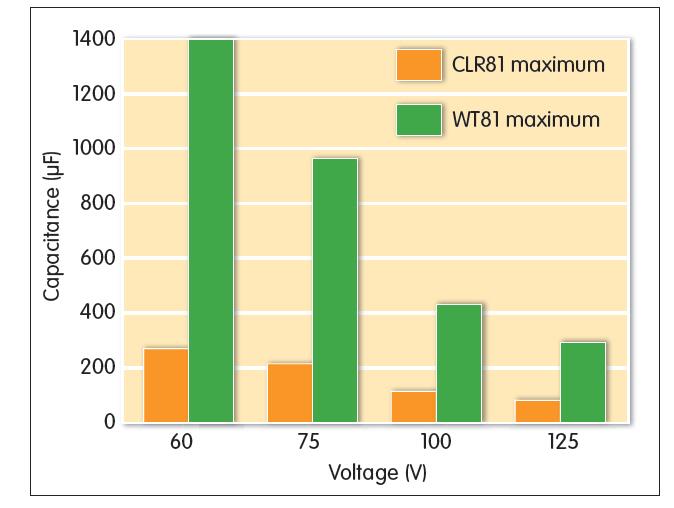Wet tantalum capacitors are one example of where a new generation of products and performance has been introduced. As the preferred capacitor technology for filtering, energy storage and energy conversion applications, wet tantalum capacitors are typically used where their high energy density contributes to reducing the overall size of the end-product.
The energy density achieved by the latest generation of tantalum capacitors, such as Exxellia's WT83 series, is up to six times greater than that of the standard CLR81 or MIL-C-39006/25 device (see fig 1). The resulting savings in board space can also help to reduce the size and overall weight of end-products, which can be critical for defence and space applications.

| Fig 1: The latest wet tantalum capacitors can offer up to six times the energy density of standard parts |
Other performance parameters include the ability to withstand shocks of up to 100g and vibration of up to 50g, in addition to operating over temperatures ranging from -55 to 125°C.
Other technologies pushing the boundaries of high-temperature operation include Kemet's T501 and T502 solid tantalum capacitors. Although designed for down-hole applications, the ability to operate at temperatures of up to 215 or 230°C makes these capacitors viable for defence and aerospace applications.
PHS capacitors
Relatively new, the Polymer Hermetically Sealed (PHS) capacitor offers measureable performance advantages in COTS applications, with higher resilience to shock, vibration and high temperatures, compared to other capacitor technologies. In comparison with solid tantalum capacitors, for example, PHS technology achieves lower equivalent series resistance (ESR) and greater stability over both temperature and voltage. They also improve leakage current compared to aluminium electrolytics and can be used as a cost-effective alternative to wet tantalum capacitors.
Kemet's T551 series of PHS capacitors is a higher-temperature version of the T550 series, some values of which have been qualified for high reliability flight and space applications. With a temperature range of up to 125°C and voltages up to 60V, T551 capacitors are said to offer the highest voltage and deliverable energy, combined with the lowest leakage current, compared to other solid tantalum capacitors. A robust anode and a benign failure mode are also particularly important criteria for defence and aerospace applications.
In COTS applications, the option of additional quality assurance or manufacturing processes, such as simulated breakdown screening (SBDS) and F-Tech testing, can help to ensure the long-term robustness and reliability of components.
F-Tech, an improved approach to anode manufacturing, is designed to minimise the carbon and oxygen content of the anode. In tantalum and niobium capacitors, these elements can cause crystallisation of the anodic oxide dielectric and lead to failure in the field.
In comparison, the patented SBDS process improves on the traditional DC leakage test by enabling 100% of the product to be screened. A higher breakdown voltage indicates a stronger dielectric and higher reliability in the field. This allows the component manufacturer to screen for the most reliable capacitors from a given lot.
The combination of F-Tech testing and SBDS can be used to test capacitors intended for use in power supplies, DC/DC conversion, filtering and microprocessor decoupling in applications such as guidance, radar, targeting and communication systems.
Advances in resistor technologies include the Water Insoluble Nitride (WIN) thin-film resistors, developed by TT Electronics Welwyn. These provide highly stable, predictable life drift and high reliability, even in exceptionally humid or polluted environments or in the event of damage to the component's coating.
When their coating is damaged, the devices can self-passivate by forming a very stable oxide layer which protects the resistor from the moisture failures associated with nichrome resistors.
Testing against the MIL-PRF-55342 standard has demonstrated that WIN resistors surpass the required performance for shock, low- and high-temperature operation, short-time overload, biased damp heat and moisture resistance. The terminations of the standard WIN resistors are sulphur-resistant, whilst Pb terminations may be offered as an option for RoHS-exempt applications.
Waterproof power supplies
Another patented technology which is helping to make power supplies rugged enough to be used to supply portable or decentralised power, even in extreme applications such as naval or combat operations, is thermoselective vacuum encapsulation technology.
Developed and patented by power-supply manufacturer MTM Power, this approach is being used in ultra-durable and waterproof 'plug and play' power supply modules.
Typically, conventional power supplies are installed in cabinets or enclosures that provide IP67 level protection against the ingress of dust, humidity or water. In comparison, MTM's PM-IP67 modules provide the same level of protection in a plug and play module for field-based applications.
The modules are resistant to shock and vibration, as well as dust and humidity, in addition to being free from the effects of mechanical stress and the ingress of air. Efficient heat dissipation from the integrated power semiconductors also enables an extended service life-time. The encapsulation material is also self-extinguishing, according to UL94-V0.
Typical applications for these AC/DC converter modules include supplying power for control, sensor and actuating systems or as portable supplies in communication systems.
The modules cover single output voltages of 5, 12, 15, 24, 36 and 48V and single output powers of 50, 75 and 100W, with an option of 200W for single and dual outputs.
New passive and power-supply technologies can help designers in the defence and aerospace markets to improve performance by enabling systems to operate at higher temperatures and higher voltages and with higher reliability.
Debbie Rowland is a director at Charcroft Electronics













